In 2018, the property market will take a "roller coaster". Should the regulation be loosened?
People’s livelihood investigation bureau
Editor’s note:
This is the People’s Livelihood Investigation Bureau, which has never been seen before, investigating the changes in people’s livelihood. Pay attention to what you want to pay attention to and what you don’t, and investigate what you want to see and what you don’t see.
Chinanews. com client Beijing, December 18 th:People’s livelihood investigation bureau: In 2018, the property market will take a "roller coaster". Should the regulation be loosened?
Reporter Qiu Yu
The nationwide hot air of buying a house has been blowing for more than three years, and finally it came to an abrupt end in the second half of 2018. Because of dissatisfaction with falling house prices, some local old owners smashed the sales offices of real estate enterprises.
"In 2018, the property market is like a roller coaster, and buying a house is more like a gamble." Someone is so ridiculous.
Ice and fire in the first half of the year
On May 7, 2018, Hangzhou Xuhui Baolong East Lake City opened its house selection. Although the location is 40 kilometers east of the bustling area of West Lake, it still attracts nearly 3,000 people to sign up, and 16 people grab a suite, with a winning rate of only 6%.
A 98-year-old grandmother was crowded in the crowd, and she successfully bought an 89-square-meter new house by lottery.
It is not uncommon for the whole family to buy a house through a thorough policy, just like a loving couple divorcing to buy a house. Due to the price limit policy, new houses in some cities are even cheaper than the surrounding second-hand houses. This temptation makes people firmly believe that buying is earning.
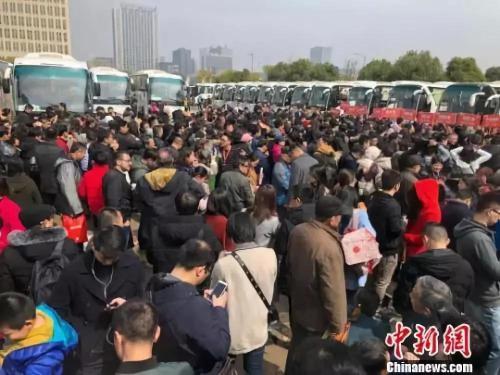
In the first half of 2018, Hangzhou, Xi ‘an, Chengdu, Changsha and other cities experienced the phenomenon that the winning rate of buying a house by lottery was less than 10%. The probability of buying a new house was similar to that of Henan and Shandong, the most populous provinces.
Some people even wonder if the era of "10,000 people shake the number" is really coming.
However, looking at the whole country, the property market during that period was like the weather in summer, where the drought died and the waterlogged place died.
Buyers in the second, third and fourth tier cities are still immersed in the expectation that buying a house will rise, while the first-tier cities have already woken up and the surrounding property market has even begun to slump.
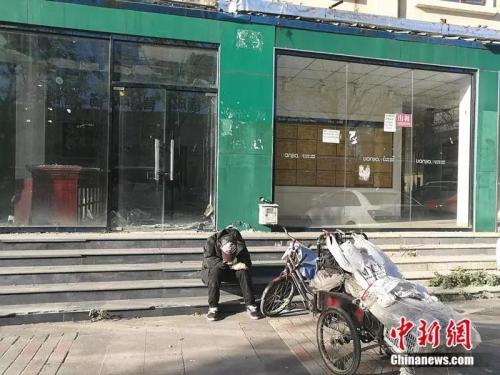
In October 2018, Yanjiao "sold a street". A loaded tricycle was parked in front of the closed chain store. The owner of the car sat on the ground and buried his head deeply in his arms. Zhongxin.com reporter Qiu Yushe
In March 2018, He Yu and his wife took the down payment from their parents and spent 3.2 million yuan to buy a small two-bedroom apartment of 80 square meters on the edge of the Sixth Ring Road in Beijing.
Two years ago, He Yu took a fancy to a house with the same apartment type and the same area in the same community. The offer was only 2 million yuan, but the owner’s starting price rose by 100,000 yuan, and the young couple didn’t buy it in anger. Who thought that the house price would be put on the wings and go away?
Later, on March 17, 2017, Beijing’s so-called "strictest" new property market regulation policy fixed the highest historical transaction price of two-bedroom houses in this community at 3.9 million, and then slowly fell back to 3.2 million.
He Yu wasn’t sure whether he earned 700,000 yuan or lost 1.2 million yuan. The only thing he knows for sure is that,House prices are like a roller coaster. Originally, I wanted to buy a self-occupied house to live in peace, but it was like taking part in an adventurous gamble.
Looking back, fortunately, there is still time for Beijing to wake up gradually, while the property market around Beijing has directly fallen from a dream into another nightmare.
For example, Yanjiao, which is close to Beijing, introduced a series of purchase restriction policies in March, April and June in 2017, which drove Yanjiao property market into an ice cave. The house with one bedroom and one living room facing the northwest of Tianyang City in Yanjiao, the transaction price of chain home reached 31,000/square meter in March 2017, and only 15,000/square meter in September 2018, a drop of 50%.
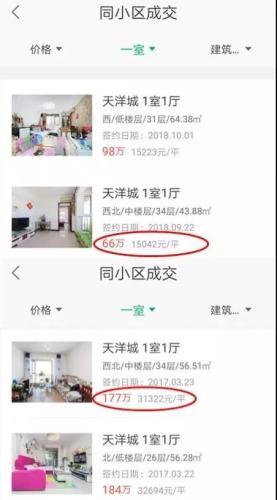
"watershed" of the property market in the second half of the year
House prices fell like a mountain, and when they rose that year, they were like wild horses, and the reins of regulatory policies could not be pulled.
Since Beijing released this round of tightening property market regulation policy on September 30, 2016, the nationwide property market regulation has not stopped, and it reached its peak in 2018.
According to the report of China Academy of Social Sciences, since 2018, the real estate regulation and control policies have been continuously increased, and the number of real estate regulation and control in China has reached 405 times, up nearly 80% compared with the same period in 2017.Almost every day, a measure is introduced, setting a new record.
There are more and more patterns of regulation, from restrictions on purchases, prices, loans and sales to restrictions on divorce, new homes, companies and minors, to simultaneous renting and selling, with the intention of curbing all the signs of real estate speculation.
Finally, the turning point came on the last day of July 2018.
On this day, Politburo meeting of the Chinese Communist Party issued a clear regulatory signal: resolutely curb the rise in housing prices.
Sharp people immediately found that the new formulation lacked the word "too fast" compared with the "curbing the excessive rise in housing prices" proposed in the government work report in March 2017. If the expression "too fast" still has considerable room for flexible operation, then the new expression will no longer leave any room. If it can’t go up, it can’t go up.
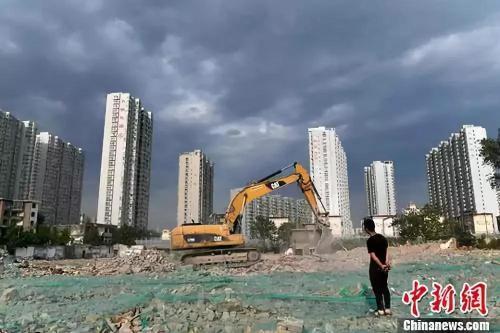
Data Map: Workers operate excavators in a commercial housing construction site in Taiyuan, Shanxi. China News Service reporter Wei Liang photo
The warm wind came to an abrupt end and the house price finally fell!
According to data from RealData,The monthly listing price of 100 cities decreased month-on-month. From March to May, 2018, there were 19 cities per month, 25 cities in June and 19 cities in July, and it suddenly increased to 47 cities in August.
More and more properties are joining the ranks of price reduction. In September, Evergrande first offered a nationwide promotion discount, with 8.9% off for houses and 60% off for shops. A project in Taihe gives a big discount. If the purchaser buys the house in full, the house price will be given a 30% discount; Sunshine City started the "100 billion offensive" preferential purchase season, and formulated different price reduction strategies according to different regions.
It’s just that something unexpected happened.
It was once believed that the brick poured with reinforced concrete was the best tool to deal with inflation. Buyers couldn’t stand the drop in house prices and angrily threw bricks at the developers.
In October 2018, a sales office in Country Garden in Shangrao, Jiangxi Province was smashed because the developer reduced the price from 10,000 yuan/square meter to 7,000 yuan/square meter, which triggered a large number of old owners to defend their rights.
Some owners lost 200,000 to 300,000 yuan when their mortgage was not done, and some owners bought 5 suites, which was emotional. They shouted "check out", threw eggs at the sales office, collided with the door of the sales department and had physical conflicts with the security guards. Some people were dragged ten meters away and even trampled into the hospital during the process of defending their rights.
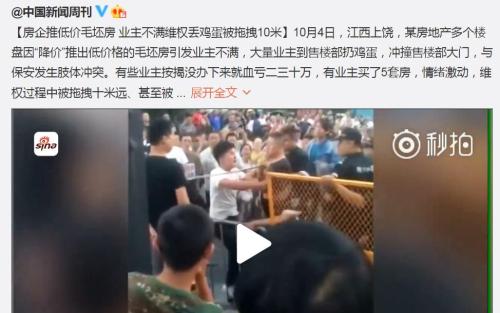
Hangzhou, Hefei and other places have also seen the phenomenon of owners besieging sales offices because of the price reduction of houses.
Some people ridiculed that on the National Day of 2016, many people went out to play and found that not only could they not afford a house, but even the qualification to buy a house was gone. On the National Day this year, many people went out to play and came back to find that not only were there more houses, but many sales offices were smashed.
Developers have a hard winter.
Developers can’t blame the people who buy houses for turning their faces. After all, the money people throw at the property market has made a large number of housing enterprises.
In the past two years, the market has been very good. Housing enterprises, large and small, have learned to set a small goal first. Large housing enterprises are rushing towards one trillion sales, and small housing enterprises in the corner have boldly shouted out the goal of one hundred billion.
We must know that the top three Country Garden, Vanke and Evergrande in 2017 had annual sales of only over 500 billion yuan.
But by 2018, the problem is coming.
With the deepening of the regulation of the property market and the promotion of deleveraging, the "financing difficulty" of housing enterprises has become a common problem. Bank credit has shrunk, the financing channel for land acquisition has been blocked, domestic bond issuance has been suspended, and the cost of overseas bond issuance and trust financing has risen.
For example, R&F Properties has failed to issue bonds four times in a row this year, so it has to fight for the breathing space of funds through equity issuance and other means.
Another example is Evergrande. In November, the annual interest rate of issuing bonds was as high as 13.75%, nearly twice as high as in the past, which shows how urgent the desire for funds is.
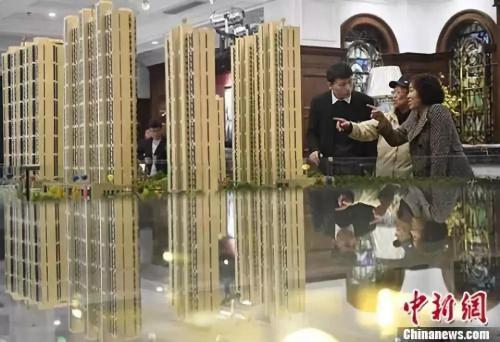
In addition to market financing, the source of funds is sales receipts. But in the case that the house is not easy to sell, the payment has also become a problem. To this end, some developers do not hesitate to operate illegally.
In October 2018, a salesperson in Peacock City, a subsidiary of Huaxia Happiness, said that in Dachang County around Beijing, people who are not qualified to buy houses can also buy ordinary houses. You need to pay the full amount, then hand over the house, and then transfer the ownership after the number of years of social security tax payment certificate is enough. But what if the property buyer pays the full amount but doesn’t get the property right of the house, and the money hits Shui Piao? Sales avoided talking about this.
In December 2018, a salesperson of a real estate for sale in Beijing revealed that the real estate supports down payment by stages, with half paid in the early stage and the rest paid after the year.
"At the end of the year, all developers are a routine, all sprinting tasks and speeding up payment." The salesperson said.
For housing enterprises, if they can’t get the money and the payment is slow, they can only lie in the dry pool of funds and wait for rescue. Coupled with the heavy debt, it is even more difficult to breathe.

In October 2018, Yanjiao sold a street, and there was no tenant outside several sales offices. Zhongxin. com reporter Qiu Yu
"In the first half of this year, the asset-liability ratio of housing enterprises reached 80% (red line). A few housing enterprises were unable to support the scale expansion of enterprises because of their high leverage ratio, which eventually led to cash flow break and debt default." Liu Zhifeng, president of China Real Estate Association, said.
Let’s take a look at R&F Properties. Its third quarter report in 2018 shows that interest-bearing liabilities are as high as 155.6 billion yuan. The book capital of about 6.3 billion yuan is not enough to cover the financial cost in the coming year.
According to the data of Evergrande Research Institute, in the first half of 2018, excluding private financing and loans from financial institutions, the balance of interest-bearing liabilities of real estate enterprises in China reached 19.2 trillion yuan, equivalent to a quarter of China’s GDP. The next four years will be the centralized payment period of debts, and the financial pressure of housing enterprises will continue to increase.
If the debt expansion in the upward period of the property market is a sharp weapon for overtaking in corners, then the debt expansion in the downward period is undoubtedly burying itself.
Not long ago, Vanke, a giant in the real estate industry, shouted the slogan of "live", which made peers tremble. Regardless of whether Vanke is crying or crying, if even Vanke with low debt and healthy cash flow can’t survive, how can a large number of small and medium-sized housing enterprises spend the winter?
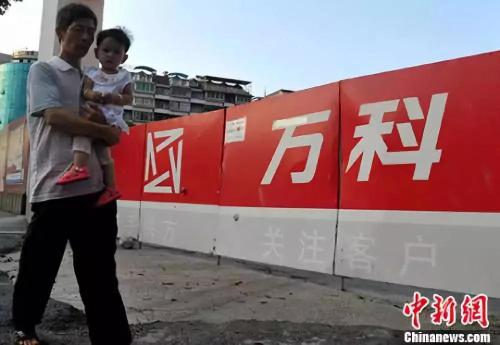
Will regulation be loosened?
Another subtle change occurred in November 2018, and the financing of housing enterprises showed signs of recovery.
According to the statistics of the Central Plains Real Estate Research Center, in November, many real estate companies across the country were intensively approved to issue large-scale financing, with a total amount exceeding 100 billion. Dozens of housing enterprises such as Vanke, Poly, Sunshine City and Xincheng Holdings obtained financing through various forms.
Mortgage interest rates have also begun to "brake". Some bank mortgage interest rates in several first-and second-tier cities have been lowered, and the speed of lending has generally accelerated.
According to the latest report of Rong 360, in November, the average interest rate of the first home loan in China was 5.71%, which was the same as last month for the first time. Since 2017, the national first home loan interest rate has finally stopped.
Regulatory policies have also been significantly reduced. According to incomplete statistics, since November, local real estate control policies have been issued about 20 times, which is significantly lower than the previous average of 40 times per month.
Housing enterprises frequently get financing, mortgage interest rates are lowered, and regulatory policies are reduced. Can this be regarded as a harbinger of regulatory relaxation?
"The recent approval of housing enterprises to issue bonds has indeed improved, but it cannot be directly understood as regulation and relaxation."Zhang Bo, chief analyst of 58 Anjuke Real Estate Research Institute, said.
"First, there was a serious shortage of financing in the first three quarters, which triggered a sharp increase in financing pressure in the fourth quarter. Under the background that many housing enterprises had demand for development funds before and debt repayment pressure later, financing could only become more radical; Second, from the perspective of the state’s supervision of housing enterprises’ funds, there is no obvious signal of loosening. " He said.
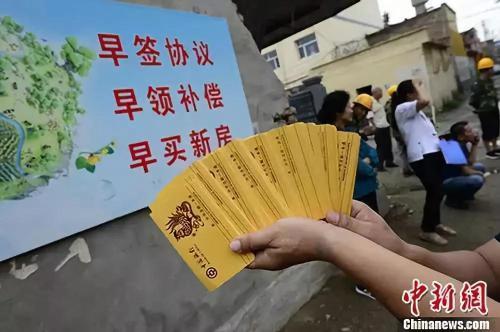
Zhang Bo believes that the deep-seated reason for the downward adjustment of mortgage interest rate is not the relaxation of regulation. Judging from the timing and rhythm of the current downward adjustment of mortgage interest rate, it is directly related to the central bank’s repeated targeted cuts to required reserve ratios and the release of market liquidity in the second half of the year. There is still room for downward adjustment of interest rate in the future, especially the preferential interest rate for the first home loan is expected to continue to increase.
In terms of regulatory policies, Zhang Dawei, chief analyst of Zhongyuan Real Estate, believes that the obvious slowdown in house price increase is the main reason for the reduction of binding policies. However, although the control policy has bottomed out, it will still run at the bottom for some time.
"On July 31st this year, Politburo meeting of the Chinese Communist Party explicitly proposed to resolutely curb the rise in housing prices, which means that the regulation cannot change direction in three to five months, and it is a high probability event to last for about three quarters. Now that the regulatory policy has stabilized, it will not be overweight, but it will not relax for the time being. " Yang Hongxu, vice president of Yiju Real Estate Research Institute, said.
Many people care, how to go in the future?
The report released by the Chinese Academy of Social Sciences in December pointed out that a small adjustment of the real estate market next year is a high probability event.In the coming year, the upward pressure on the market in first-and second-tier cities as a whole will increase, and the future trend will be dominated by growth; The downward pressure on the market in third-and fourth-tier cities is increasing, and the inventory may increase again.
Looking back over the past 10 years, the national property market has experienced two sharp cooldowns, one in 2008, affected by the global financial crisis, and the other in 2014, due to the increasing downward pressure on the economy, but the two times were only short-term corrections in the general trend of rising house prices.
In 2018, it is the opening of the long-term downward channel of the property market, or the beginning of another short-term cycle of ups and downs. It may take five or ten years before we can see clearly. (End)